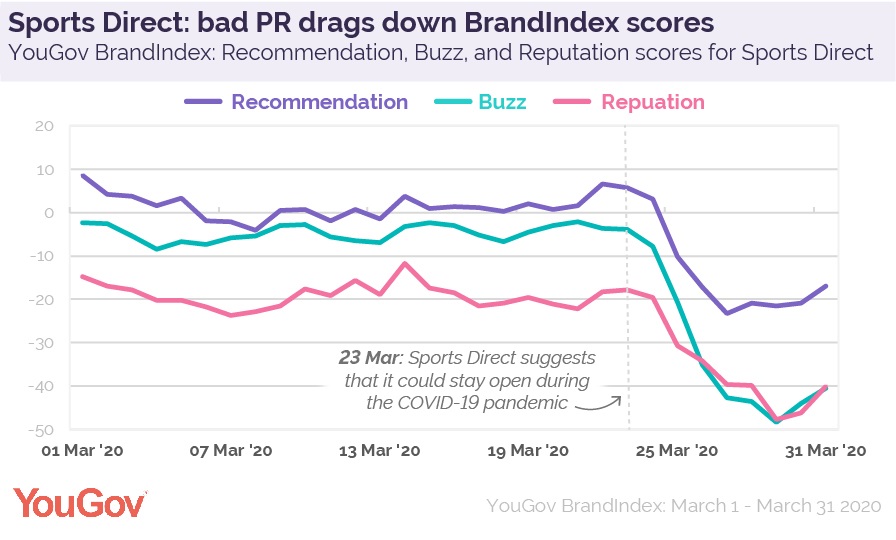Coronavirus: Sports Direct-ly to a negative reaction

Sports Direct recently attempted to keep its stores open despite the Government’s COVID-19 lockdown – arguing that, with gyms closed and Brits stuck indoors, exercise equipment counts as an essential service.
YouGov polling reveals that the public overwhelmingly disagrees. Some 95% of Brits believe that sports equipment stores are not key services, and just 3% say that they are.
Sports Direct was clearly on the wrong side of popular opinion, and judging from its hasty reverse-ferret – closing its high street locations and apologising after a public backlash – its senior management knows it.
But beyond the retailer’s abortive attempt to keep its high street stores open, it has been condemned for hiking the online prices of certain products, and for making staff go to work during a public health crisis. YouGov BrandIndex shows that this recent behaviour may have had an adverse effect on consumer perceptions.

Read more: Sports Direct reverses course on closures
In the first week of lockdown (23/03 – 30/03) the company’s UK Index score – a measure of overall brand health that takes the average of Impression, Quality, Value, Satisfaction, Recommendation, and Reputation – fell from 1.1 to -18.4.
And if Sports Direct’s overall score took a serious hit, it performed even worse across certain individual metrics. Thanks to unflattering headlines, buzz scores suffered in the first week of lockdown, plummeting from -3.9 on the 23rd to -44.0 on the 30th.
Sports Direct’s already low reputation score – in the past 12 months, it hit a peak of -10.0 – also tumbled from -17.8 to -46.3 over this period. What’s more, between the 23rd and the 30th, consideration fell from 22.9 to 14.1, and recommendations went from solidly positive (5.7) to emphatically negative (-30.9).
In the past few years, Sports Direct has been criticised for ‘gulag’-style working practices, misleading marketing, and the mercurial behaviour of its CEO.
But while its latest troubles may amount to one more PR scandal among a number of others, they also suggest that consumers are paying attention to company behaviour during this crisis – and that there could be commercial consequences for retailers that fall short of their standards.